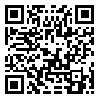Volume 3, Issue 4 (2012)
LRR 2012, 3(4): 43-66 |
Back to browse issues page
Download citation:
BibTeX | RIS | EndNote | Medlars | ProCite | Reference Manager | RefWorks
Send citation to:



BibTeX | RIS | EndNote | Medlars | ProCite | Reference Manager | RefWorks
Send citation to:
Akbari Beiragh H, Sanaee N. The Comparative Study between T.S. Eliot and Ahmad Shamlu on the basis of Modernity Characters. LRR 2012; 3 (4) :43-66
URL: http://lrr.modares.ac.ir/article-14-482-en.html
URL: http://lrr.modares.ac.ir/article-14-482-en.html
1- Associate Professor, Department of Persian Language and Literature, Semnan University, Semnan, Iran
2- Ph.D. Student of Persian Language and Literature, Semnan University, Semnan, Iran
2- Ph.D. Student of Persian Language and Literature, Semnan University, Semnan, Iran
Abstract: (12067 Views)
This is a comparative study between two outstanding poets from two different cultures and civilizations. We try to show the effect of modern attitude on the two poets, T.S. Eliot and Ahmad Shamlu. For this purpose, we explain the word modern in the first part, then the history of modernity in Iran and Europe is described in brief. At the end, their similar thoughts and works are compared on the basis of modernity and literary modernism characters. Also we go through details of modern thinking in the above poets. We can brief our reasons for choosing these two poets for comparative study in these factors as: First, they lived approximately at the same political, social and cultural context, which led them to create the same works and thoughts. Second, Shamlu is known as social poet and, like Eliot, lived in a revolutionary period. Eliot was under the impression of the world war and modernism, and Iranian poet had experienced 28th Mordad coup deta and the 2nd world war. Also he experienced the period of transition from traditional to modern society. So these poets have many similar characters for comparative study.
Published: 2012/02/20
| Rights and permissions | |
 |
This work is licensed under a Creative Commons Attribution-NonCommercial 4.0 International License. |






